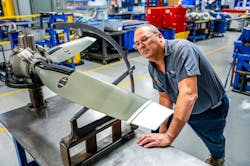In their 70th year of operation, Aircraft Propeller Service has decades of propeller repair experience under their belts. Originally focusing solely on the general aviation (GA) market, Aircraft Propeller Service has grown over the decades to service a wide range of aircraft types.
“Back in the ’90s, we started doing a lot more work with Hamilton on the ATRs and that relationship has grown over the last 25 years to the point now where we have a couple of proprietary licenses with Hamilton, now Collins obviously, to do their proprietary repairs on the ATR and the CASA propellers, said Daniel Colbert, president and CEO of Aircraft Propeller Service.
This work is done in Lake Zurich, Illinois. The company also has a facility in Brazil and is in the process of identifying and opening another in Kuala Lumpur.
Their licenses with Collins are in the Americas and Asia, but Aircraft Propeller Service is also active in Europe to a degree.
“We service a lot of the legacy fleets in Europe beyond what we just do in the Americas and Asia. We also have a little bit of a presence in our Brazil shop doing helicopter actuation. We continue to broaden our portfolio and as most do, grow well beyond that GA origin,” Colbert said.
Prop Advancements and Maintenance
Props themselves are starting to get a lot more advanced, said Chris Hutchings, director of sales and market development.
MT Propeller, for example, is adding more and more blades to their propeller assembly.
“The deicing elements that go inside it, the construction of the blades themselves, that’s all become way more advanced,” he said.
Comparing Hartzell’s composite propellers with a nickel sheeting bonded onto the design to wooden, fixed pitch propellers shows how far propellers have evolved, Hutchings said.
“The people that are really pushing the envelope for GA are the Hartzells, the MTs and the McCauleys of the world. They’re coming up with newer, more technical designs every single year,” he continued.
Foreign object damage (FOD) is a major culprit of propeller damages at GA airstrips, Colbert said. Paved and unpaved fields will have different FOD concerns. An unpaved strip, for example, will have stones.
When a prop comes in for repair, the process starts with cleaning and disassembly then based on the component maintenance manuals (CMM) that are provided by the OEMs, Aircraft Propeller Service walk through the repair step by step from the tip of the blade down to the base.
“If there’s a taper bore, we walk into the taper bore as well and we do a full inspection. That can include any current mag particle, fluorescent penetrant inspections -- so we come up with what exactly needs to be done. Sometimes the blades need straightening, they need to be re-pitched or resealed. That’s what our technicians in the shop do,” explained Hutchings.
Hutchings said props can sit idle for quite a long time and develop corrosion. Something that they see a lot with regional aircraft, which can also affect GA, is not rotating the props.
“If somebody has their plane parked and they’re not flying for a month or two months, those propellers should be rotated 180 degrees every 30 days. It basically distributes the hub oil over all the components and dramatically reduces your incidents of corrosion,” Colbert said.
He said people tend to forget to perform that simple maintenance procedure.
It’s a very simple thing to do, but some things are just like that, easy to forget about, but they make a world of difference, Colbert said.
Another thing they see in the shop: “people don’t replace engine oil enough, which also leads to corrosion,” said Hutchings.
On the other end is over-greasing.
“A lot of the times, people go around and they see grease nipples on a prop and they just pound it in there and put as much grease in as they can, and that basically just seizes the prop and stops it from actuating properly,” said Hutchings.
To best keep propellers well maintained, Colbert suggests follow the recommended guidelines provided by the OEM.
“The operators that have solid maintenance practices that invest in training that make it a priority have much lower maintenance costs and overall cost of ownership. On the other end of the spectrum are the people that just ride it hard and put it away wet and then are surprised when their maintenance bills are very high. To me, the basic is just follow the recommended practices,” he said.
Prop Challenges
Supply chain issues have been the greatest challenge for Aircraft Propeller Service of late.
“When you think about a lot of these blades and even if it’s a composite blade, you have a metal shank and a lot of those metal components are exotic alloys and the issues in Ukraine and in Russia impacted that metal supply chain, especially for those alloys. It was a multitude of factors that it all contributed to the supply chain having issues ramping back up for the small OEMs and big OEMs,” said Colbert.
He added that they see the difficulties in the supply chain continuing, but expect them to be fully back to normal, hopefully, by the end of this year or early next year.
“We’re by no means out of the woods in terms of that,” Colbert noted.
Another issue is the age of the GA fleet.
“The general aviation market specifically, the other big issue is obsolescence. A lot of these aircraft were made from the ’50s to the ’70s, there was a huge bulk of planes that were manufactured in that time and larger OEMs are no longer supporting 40-year-old aircraft anymore,” said Hutchings.
Finding some items is like trying to find gold dust on the market, Hutchings added.
“Typically, at overhaul, they send in the propeller and they’ll send in the governor at the same time for inspection. A lot of times that’s where we just flip it out and sell them our unit,” described Hutchings.
Aircraft Propeller Service has stepped up to mitigate the issue by developing their own Parts Manufacturer Approval (PMA) for obsolete propeller governors that are associated with prop.
About the Author
Walker Jaroch
Editor
Contact: Walker Jaroch
Editor | AMT
+1-920-568-8399
>> To download the AviationPros media kits, visit: Marketing Resource Center
>>Check out our aviation magazines: Ground Support Worldwide | Airport Business | Aircraft Maintenance Technology

